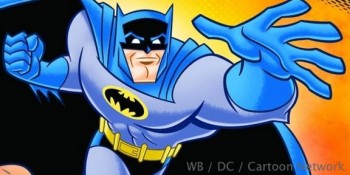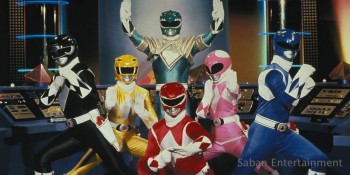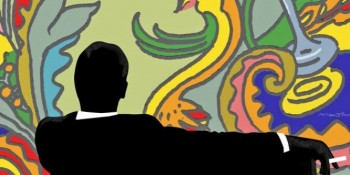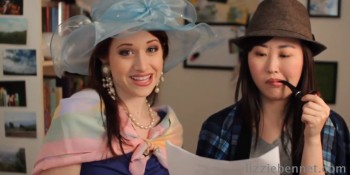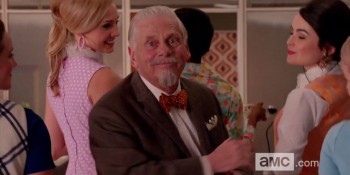Batman: The Brave and the Bold (Cartoon Network)
Where to binge: All three seasons available on Netflix
Since 1992, the Dark Knight Detective has been a television staple, beginning with the ground breaking Batman: The Animated Series and continuing through to Beware the Batman. Outside of and before the Batman-centric cartoons of the past 20 years, Bruce Wayne’s alter ego could be found guest-starring on The New Scooby-Doo Movies or fighting nonsensical crime alongside Aquaman and Wonder Woman as a member of the Justice League as imagined in the sundry Super Friends series.
The common thread that runs through these appearances (well, with the exception of the lighthearted humor of the Super Friends) is that Batman is consistently depicted as a grim avenger of the night, a man who has been consumed by his quest for vengeance against the superstitious and cowardly criminal lot that killed his parents and brought Gotham City to the brink of ruin. Sure, there are moments of deadpan humor, and the occasional bit of outright comedy — what fan of the DC animated universe didn’t love the tongue-in-cheek humor of the Justice League Unlimited episode “This Little Piggy“? — but the overall feel of the character is one of driven, determined seriousness.
Which brings us back to the Super Friends. There was a time in Batman’s history when he was more lighthearted and fun. The Silver Age of Comic Books was a wacky time, with time travel, utterly ridiculous villains, and dozens on dozens of obscure and short-lived heroes with offbeat powers. It was a very different time in comics than today, a time when some stories were being written to children, where the art was still getting its feet under it. The industry was trying to figure out what it would become. It was a time of imagination and exploration, and much of what we consider as the mythos of comic books was established in these formative years.
Batman: The Brave and the Bold was the first, and so far only, animated series to truly embrace the entirety of the wonderful, off-beat, imaginative world of the Silver Age. And it is absolutely brilliant.
This is no small achievement. Following on the heels of the incredibly popular DC animated universe meant that The Brave and the Bold had some big shoes to fill. Had they chosen to play up the darker and edgier elements of the Batman, the show would have felt like a pale imitation of the widely successful Animated Series (a trap that Beware the Batman, the current animated incarnation, is at risk of falling into).
But by choosing to celebrate the madcap fun of the Silver Age, The Brave and the Bold has carved out a unique space in the world of comic-book-inspired animated shows. The animation uses a much brighter color palate than previous animated DC shows. The art feels very much like a four-color comic book. The characters are drawn in a style that smacks of classic Silver Age aesthetics. The occasional computer-generated animation sequence pays tribute to that other famous style of animation, anime. All of these elements come together and form a unique and wonderful look and feel.
The show, which is based on a concept first introduced in the pages of DC Comics, is structured with a short lead-in story that pairs Batman and another hero, usually one of DC’s more obscure characters, in a fight against some evil. These lead-ins serve as character development, allowing the audience to meet many of the show’s recurring characters before they appear in a major storyline. The lead-in story doesn’t usually connect to the rest of the episode, but it is always used to expand the universe.
The show is very episodic, building a world over the course of a season while creating the setup for a two-part grand finale for each season. This “problem of the week” model of storytelling allows the writers to pay tribute to the vast scope of classic comic book storytelling. Episodes range from time-and-space travel, cosmic-level hijinks, classic storyline references, to down and dirty crime drama. Heck, there is even a musical episode, guest-starring none other than Neil Patrick Harris himself.
Voiced by Diedrich Bader, Batman is a deadpan snarker, delivering puns and one-liners that come directly from the Adam West school of Batman acting. The rest of the voice cast includes many well known names (Dee Bradley Baker, John DiMaggio, and many more) voicing just about every major, minor, and throwaway character that has ever graced the pages of a DC comic, along with several created exclusively for the show.
While The Brave and the Bold willingly embraces that Super Friends sense of camp, as well as the Silver Age predilection for storylines that are way over-the-top, it does so with respect and an honest admiration for the classic nature of the characters and the time period that birthed them. What distinguishes The Brave and the Bold is that it treats what the characters will become in the Bronze and Iron Ages of comics with just as much respect. The Brave and the Bold doesn’t just appeal to our retro-comics sensibilities; it uses them as a springboard for innovation.
Just look at how the character of Aquaman got a much-needed shot in the arm here, going from the guy who talks to the fishes to the brave, bombastic, and completely outrageous king of the sea. Or perhaps at the Starro invasion and its study of heroism through the sacrifice and death of B’wana Beast. The episode “Chill of the Night!” is one of the best explorations of the tragic death of Batman’s parents and how it shaped a young Bruce Wayne that has ever been put on the small screen, combining classic and modern Batman sensibilities and Dickensian representations of the Phantom Stranger and the Spectre seeking to claim Batman’s eternal soul.
It’s hard to sell a series to people by talking about its final episode, but I would be remiss not to mention “Mitefall!” Not only is it a zany, hilarious, self-referential adventure romp, but it is a work of love, a good-bye letter to the fans who took a risk on a different kind of Batman show and, in so doing, found themselves rewarded beyond their expectations. In a series where every episode is a love-letter to DC comics, “Mitefall!” is the capstone, the last chance the writers and the cast had to pay tribute to all the great stories of the Silver Age, be they serious or funny, dark or full of laughter, drama or comedy.
All three seasons of Batman: The Brave and the Bold can be streamed on Netflix right now. If you want to take a retro-themed romp through the DC Universe, put aside your preconceptions of what makes a good Batman story and give The Brave and the Bold a watch.
Batman: The Brave and the Bold originally aired from 2008 to 2011 on the Cartoon Network.
